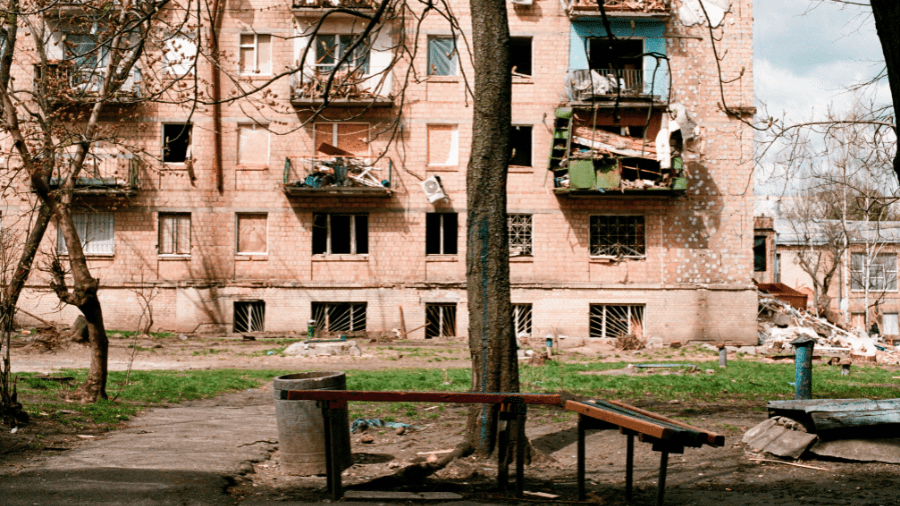This article originally appeared in the Hub.
By Richard Shimooka, December 7, 2022
The past few weeks have seen a concerted campaign by the Russian Federation against largely civilian targets, including the targeting of power systems and other basic utilities to rob the civilian populace of basic necessities as the harsh winter looms. The scenes are tragic: surgeries under emergency lighting, children on breathing-aid machines plugged into emergency power locations, people lined up in freezing weather for water.
The anti-infrastructure campaign has parallels to previous military campaigns. Essentially, the strategy of strategic bombing harkens back to the Second World War. The methods may look different since Russia is largely relying on its limited stocks of long-range cruise missiles and drones to pursue this approach. However, that’s largely the result of the tactical situation over Ukraine: Russia would otherwise suffer unsustainable losses to its air force if it attempted any other approach.
Russia’s application of this strategy is one largely borne out of necessity—its armies are in a poor state after successive defeats east of Kharkiv and in Kherson, as well as absorbing hundreds of thousands of ill-trained conscripts. While it continues a grinding push in Donetsk province, the relatively limited scale of its efforts there more likely illustrates its much-weakened state. Furthermore, the approaching winter will only further constrain its options.
Normally, the winter months tend to see a slowdown of combat operations. But this change in operational tempo will disproportionally affect less well-prepared units, with newly mobilized Russian soldiers being particularly vulnerable. It might be spring at the earliest that Russia’s army could reconstitute itself to a sufficient degree to launch limited offensives, but it is hard to imagine such a force being able to win decisively against the Ukrainian military.
With Putin’s ability to win on the ground no longer feasible, aerial bombing is really the last potentially war-winning tool available to him. But what are its prospects?
The use of strategic bombing has remained a highly controversial and contested topic among academics, policy-makers, and strategists. The ethics and morality of strategic bombing pose an essential question for democratic states at war, where perpetrating gross human rights abuses can quickly undermine support at home and the potential for victory in the field.
Yet, such concerns are of little to no relevance to Putin’s authoritarian regime, which has frequently employed terror against the Ukrainian population, as civilian massacres in Bucha, Izyum, and elsewhere amply illustrate. The Kremlin is also no stranger to indiscriminate carpet bombing for terror purposes; one only needs to look at its actions against Mariupol earlier in the spring, as well as its actions during the Syria conflict and in Chechnya.
Historically, however, strategies aimed at punishing or compelling an opposing side to give up have proven to be the least effective approach. The Royal Air Force attempted something similar during the Second World War, known as the “de-housing strategy”—essentially an effort to break the morale of the German people either by killing or destroying their homes. It was largely ineffectual at its stated objectives: even with most German cities half-destroyed, their population’s morale never really wavered.
The reality is that societies are highly resilient and such attacks are unlikely to work, even against unpopular totalitarian governments—to say nothing about a popular resistance government. The Ukrainian people have demonstrated their resolve to persevere over Russia over the past 10 months, and these new predations are unlikely to alter their calculus.
Yet attacking cities may offer other benefits aside from simply coercing a given population. For instance, the Anglo-American strategic bombing campaign against Germany forced the Nazi regime to shift a staggering amount of its resources to defend its homeland, which in turn likely hastened its overall defeat.
Similarly, the attacks on Ukraine’s civilian population have forced Kyiv and its backers to divert significant resources to try to shore up its utilities and keep its citizens safe. For example, newly acquired low-altitude air defence systems, which should have been used to support military operations on the front lines, are now being sent to defend cities and critical infrastructure deep inside Ukrainian territory. This may provide additional breathing room that Russia needs to reconstitute its forces over the winter.
In addition, Russia’s attacks have wreaked further damage to the already shattered Ukrainian economy and prevented any recovery. As with its military, the country’s economy is completely reliant on foreign assistance to keep going. For instance, the head of the IMF last month estimated it required US$4 billion dollars a month to keep Ukraine afloat. While donors have committed to seeing the country through the winter, allied support remains tenuous and could easily fracture. Considering Putin’s long-held views on the political weaknesses of Western states, he may see this as his best chance to avoid a worst-case outcome from the conflict.
Unfortunately, there is no easy path out of this situation, beyond continuing to support the Ukrainian state through this deal. Putin will search for and exploit every potential weakness to end this conflict on its terms. Canada and other like-minded states must remain stalwart in their support for Ukraine to persevere.
Richard Shimooka is a Senior Fellow at the Macdonald Laurier Institute, where he specializes in strategic studies, comparative defence management approaches and foreign policy.






